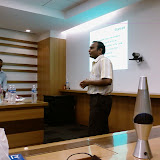Many bloggers had already spoken their part about the proceedings through live blogging.
In brief, there was bit chaos on arranging things, running the talks/session parallely, and finally it was more like session with less user participation (devitation from what usual BarCamp famous for!!!)
 |
| Sumanth Krishna @ Ruby on Rails Conference |
I wanted to present on my favorite Ruby on Rails and since BarCamp is the place where lot of young minds, entrepreneurs... assemble. So I related it (RoR) to Startups and on "Ruby on Rails relevance to Startup's". I started the session post lunch around 3PM. I did present my views on very well about the startups and when the slides related to Ruby on Rails started, I just carried away more in explaining the details of RoR.
Slides: "RoR relevance to Startups" @ Google sponsored BarCamp5 :)
Scribd
SlidShare
Please feel free to enhance/comment on the presentation.
I am planning for a Workshop on Ruby on Rails with support of Twincling society :-)



